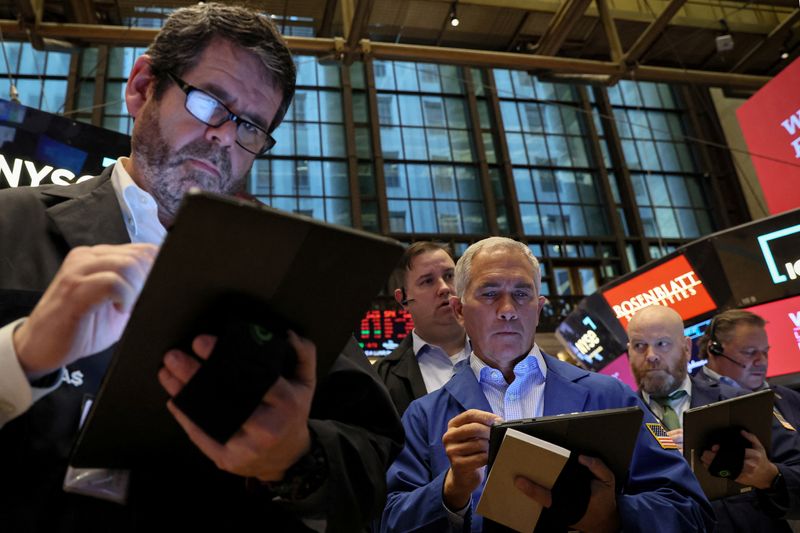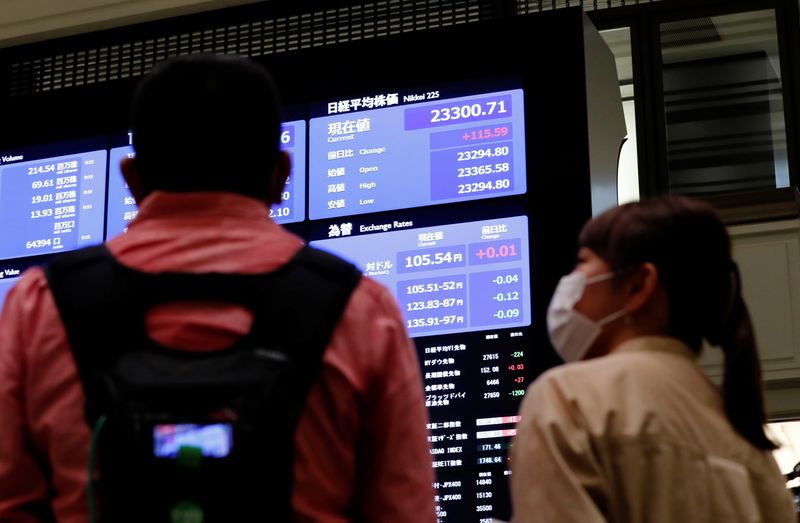By Lawrence Delevingne and Nell Mackenzie
(Reuters) -Two of three major Wall Street stock indexes declined on Wednesday, while Treasury yields marched higher, as new inflation indicators from China, Germany and the U.S. hardened expectations that high interest rates would be in force longer than expected.
China's official manufacturing purchasing managers' index (PMI) rose to 52.6 last month, marking the fastest growth in more than a decade, from 50.1 in January.
In the U.S., prices for raw materials increased last month, suggesting inflation could remain elevated after monthly consumer and producer prices surged in January.
And inflation data from Germany bolstered expectations that the European Central Bank will push interest rates higher than previously thought, a day after February numbers showed price pressures surged more than expected across France and Spain.
"Global PMI continues to point to a firmer global growth outlook - creating some upside risk to domestic activity and inflation," Citi U.S. economic strategists said in a note on Wednesday.
The Dow Jones Industrial Average was virtually flat, closing up just 0.02%, while the S&P 500 lost 0.47% and the Nasdaq Composite dropped 0.66%.
MSCI's broadest index of Asia-Pacific shares outside Japan jumped 2% to leave behind a two-month low.
The index provider's broader world stock measure was flat, with Europe's STOXX 600 down 0.74%.
BONDS YIELDS MARCH HIGHER
U.S. Treasury yields rose on fears of higher interest rates, with benchmark 10-year government bond yields hitting 4% and the two-year yield at its highest level since 2007, at 4.889%.
Germany's 2-year government bond yield, which is highly sensitive to changes in interest rate expectations, rose to its highest since October 2008 at around 3.2%.
The next flush of global economic indicators is likely to be crucial as markets assess whether future rate hikes are sufficiently priced in.
Bruno Schneller, managing director at INVICO Asset Management, said sticky inflation might compel central banks to raise rates further to prevent further economic damage, increasing the risk of policy-driven recessions.
Atlanta Federal Reserve President Raphael Bostic on Wednesday kept his view that the central bank's policy rate can stop in the 5.00%-5.25% range.
Minneapolis Fed President Neel Kashkari also said he was "open-minded" on either a 25 or 50 basis point rate hike at the Fed's next meeting on March 21-22, adding that rates might ultimately need to go above the 5.4% level he had thought in December would be adequate.
In currency markets, the dollar's February gains seem to have run out of steam, and European and Asia Pacific currencies advanced on the strength of the Chinese data.
The dollar index fell 0.39%, with the euro up 0.8%, and sterling flat on the day.
U.S. crude oil exports rose to a record high of 5.6 million barrels per day last week, according to government data. U.S. crude rose 0.9% to $77.74 per barrel and Brent was at $84.42, up 1.16% on the day.
Spot gold added 0.6% at $1,838 an ounce.
Geopolitics also added background anxiety.
Last week's visit to Kyiv by U.S. President Joe Biden and Russian President Vladimir Putin's abandonment of the last remaining nuclear arms control treaty with the U.S. signaled a hardening of positions.

China, which showed support for Russia by sending its top diplomat to Moscow last week, has issued a call for peace, though it has been met with skepticism and Washington has expressed concern in recent days that China could send arms to Russia.
"Should Beijing send Russia arms, it risks a rapid geopolitical breaking of the world economy," said Rabobank's research head, Jan Lambregts. "Markets have not even begun to contemplate what this might mean."
